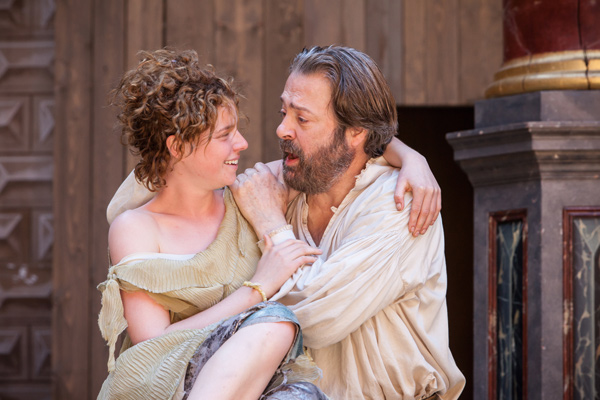The Weir is the ultimate hit-from-nowhere. It was written in 1997 by the 26-year-old Conor McPherson. It opened at the Royal Court Upstairs and glided over to Broadway and then toured America. The script defies every rule of theatrical physics. It’s wordy and static, it’s entirely devoid of action or spectacle, and the atmosphere is mired in gloom.
Four morose drinkers, stuck in a pub in the west of Ireland, try to impress a pretty incomer from Dublin by telling her ghost stories. Nothing else happens. The faint stirring of a romance between the Dublin girl and the handsome deadbeat behind the bar provides a tiny note of optimism at the end. And yet McPherson is a miracle-worker. As the clock ticks, as the beer flows, as the garrulous bumpkins natter away, a magical transformation takes place, and one’s indifference is converted into fascinated involvement. The pub is a mythical haven at the end of the rainbow; it’s the seaside resort you left in adolescence; it’s the small town you’ll return to when your days are done; it has the dependable welcoming deadness of every rural backwater; and its emotional paralysis is both its curse and its allure.
There are great performances in this understated, beautifully judged production. Ardal O’Hanlon’s favourite routine as an idiot-savant serves him well in the role of Jim, the taciturn bachelor who worships his ailing mum. Peter McDonald, a brooding, closed-off actor, finds the right note of dourness for Brendan, the stoical barman who tends his post like a war hero in a foxhole. Risteárd Cooper is marvellously skilful as the dapper and calculating Finbar, a local boy made good, whose true intentions towards Dervla Kirwan’s Valerie are drawn with brilliant uncertainty. And best of all is Brian Cox, a lone Scot in an all-Irish cast, whose accent is as thick as double cream left out in the sun. With his ample belly, his chewed-up hair and his scribbled black beard, Cox delivers a magnificent performance as Jack, the cuddly ogre who missed out on all life’s cuddles. Cox varies the melancholy with unexpected flashes of aggressive comedy or farcical passion. At times he seems like a startled grizzly bear eating a flip-flop instead of a salmon.
Josie Rourke, who directs this show immaculately, has had a difficult time since assuming command at the Donmar. Critics have refrained from making direct comparisons with her predecessor, Michael Grandage, but I doubt if audiences have been so coy. Here at last is a show that Grandage would have been proud of. In a shrewd bit of programming, Rourke follows this with a brand-new drama written and directed by McPherson. I can’t wait.
More tricky magic at the Globe. Shakespeare’s final play, The Tempest, feels like a karaoke version of all his previous work. Set on a haunted island, it’s a crazy fusion of exile, jealousy, regicide, vengeance, insurrection and bumptious romance, and it rounds off with a few cheesy reconciliation scenes. This is the only play Shakespeare plotted himself and it suggests that he couldn’t invent an original storyline. Or, rather, he preferred to work with a pre-existing narrative structure.
The play’s great attraction is the extraordinary richness, and even recklessness, of the language. Shakespeare flirts with complete linguistic meltdown in order to create dazzling poetic effects. When Prospero asks his daughter to delve into her childhood memories, he comes up with this. ‘What seest thou else in the dark backward and abysm of time?’
With its mad plot and its contrived lyricism, The Tempest works better in the reading room than on stage. Jeremy Herrin’s easy-going production is hampered by strange costume choices. Caliban, having recently escaped from an exploding slaughterhouse, is encrusted with clots of slimy red plasma. Though nauseating to look at, this attire is effective. Ariel wears a skintight bodysuit covered in McDonald’s drinking straws which make him look like a synthesised porcupine. This is less effective. More howlers encumber the stranded Italian noblemen. Having survived the hurricane that destroyed their ship, the three aristocrats seem to have stumbled across a particularly well-equipped Jacobean tailor on the beach who fitted them out with a gorgeous array of hats, ruffs, breeches and fur-trimmed cloaks. Quite handy when you’ve just been shipwrecked in the tropics, and the year is 1609.
Prospero is played by Roger Allam, who works best when fully concealed behind a wig, cape and fake paunch. His comic gift wins him plenty of laughs but he doesn’t find the manipulative and misanthropic depths of the weird tyrant Prospero. As usual at the Globe, the production is spirited and engaging but I’d recommend a skim through the text in advance. I’ve seen this play half a dozen times, and by the middle of Act II, I’m always lost.







Comments